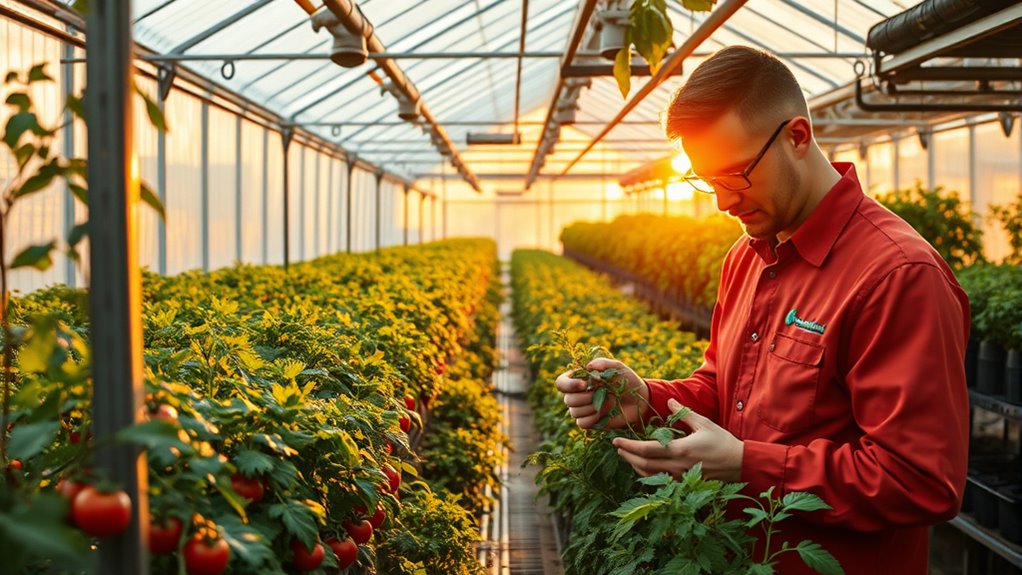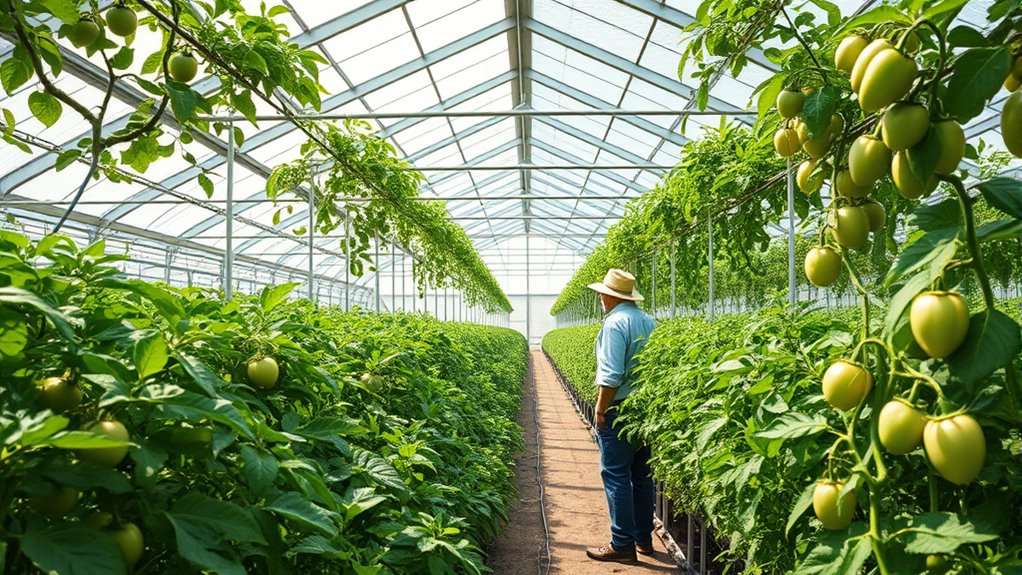Many hobbyist greenhouse growers have successfully turned their passion into a thriving business by adopting sustainable practices, innovative marketing, and strategic partnerships. By focusing on eco-friendly techniques, showcasing their unique story, and investing in modern technology, they build trust and stand out in the market. Continually adapting to trends and engaging with the community helps these growers grow professionally. Keep exploring, and you’ll discover key steps to transforming your greenhouse hobby into a profitable venture.
Key Takeaways
- Implement sustainable practices like water-saving techniques and organic fertilizers to appeal to eco-conscious markets.
- Develop a compelling brand story emphasizing environmental responsibility and quality to attract professional buyers.
- Invest in infrastructure such as automated watering and climate control systems to increase efficiency and professionalism.
- Diversify product offerings with specialty plants or seasonal flowers to expand market reach and reputation.
- Engage with industry networks and local communities to share experiences, learn, and stay current with market trends.

Many talented greenhouse growers have turned their passion into a professional career, transforming small-scale operations into thriving businesses. If you’re considering making that leap, understanding how to scale up effectively is vital. One of the first steps is adopting sustainable practices that not only benefit the environment but also appeal to eco-conscious consumers. Implementing water-saving techniques, utilizing organic fertilizers, and reducing chemical usage can set your business apart. These sustainable practices not only improve your greenhouse’s health but also create a compelling story for your brand, helping you attract loyal customers who value environmental responsibility.
Turning passion into a thriving greenhouse business starts with sustainable, eco-friendly practices that build trust and attract loyal customers.
Once you’ve established eco-friendly operations, focusing on marketing strategies becomes essential. You need to communicate your unique selling points clearly—highlighting your commitment to sustainability, quality, and freshness. Engaging storytelling through social media, your website, or local markets can foster a connection with your audience, building trust and recognition. High-quality photos and detailed descriptions of your plants or produce help customers visualize what they’re buying, encouraging repeat business. Remember, effective marketing isn’t just about promoting products; it’s about creating an authentic brand that resonates. Additionally, understanding the importance of automated systems can significantly improve your operational efficiency and consistency.
As you grow, diversifying your offerings can attract a broader customer base. Consider experimenting with specialty plants, organic herbs, or seasonal flowers to stand out in the market. Partnering with local restaurants, florists, or farmers’ markets can expand your reach and generate more sales. These collaborations also reinforce your reputation as a professional, reliable supplier. Additionally, keep an eye on market trends and customer preferences, adjusting your product lineup accordingly. Staying adaptable ensures your business remains competitive and sustainable in the long run.
Investing in proper infrastructure and technology is another key step. Automated watering systems, climate control equipment, and efficient lighting can streamline operations and reduce costs. The more you can optimize your greenhouse environment, the better your yields and quality will be. This attention to detail underlines your professionalism and commitment to excellence, which customers and partners will notice.
Finally, building a strong network within the horticultural community can provide valuable support and insights. Attend industry conferences, join grower associations, and participate in local events. Sharing experiences and learning from others accelerates your growth and helps you navigate challenges. By combining sustainable practices with smart marketing strategies and continuous innovation, you turn your hobby into a successful, professional greenhouse business that’s poised for long-term success.
Frequently Asked Questions
What Are the Initial Costs to Start a Professional Greenhouse?
Starting a professional greenhouse involves various initial costs, so your startup budget should cover greenhouse construction, which varies based on size and materials. You’ll also need to budget for heating, cooling, lighting, and irrigation systems. Don’t forget expenses like seeds, soil, and tools. Planning carefully guarantees you allocate enough funds for permits and setup costs, helping you build a solid foundation for your greenhouse business and avoid unexpected expenses.
How Do Growers Choose the Right Plant Varieties for Profit?
Think of plant selection as your secret recipe for success. You’ll want to do thorough market analysis, identifying what’s in demand and profitable. Focus on varieties that grow well in your climate, are easy to manage, and appeal to buyers. By researching trends and customer preferences, you can choose plants that maximize your profits. Remember, smart plant choices turn your greenhouse into a thriving business, not just a hobby.
What Legal Permits Are Needed to Operate a Greenhouse Business?
You need to understand zoning restrictions and licensing requirements before operating a greenhouse business. Check local zoning laws to ensure your location permits commercial horticulture. Obtain necessary permits, such as business licenses, sales tax certificates, and possibly health or environmental permits, depending on your area’s regulations. Failing to meet these legal permits can lead to fines or shutdowns, so stay informed and compliant to smoothly shift from hobbyist to professional grower.
How Can New Growers Access Funding or Grants?
Did you know that over 60% of new greenhouse growers secure funding through grants or cooperative programs? To access funding sources or grant opportunities, start by researching local agricultural agencies, government programs, and industry associations. You can also explore online databases and attend farming expos for networking. Applying for grants often requires a solid business plan, so prepare detailed proposals to improve your chances of securing financial support.
What Are Common Challenges Faced When Transitioning From Hobby to Business?
When shifting from hobby to business, you face challenges like market saturation, making it hard to stand out. Customer retention becomes vital, as maintaining loyal clients supports steady growth. You might also struggle with scaling operations, managing increased expenses, and balancing quality with volume. Staying adaptable and focused on building a strong brand helps you navigate these obstacles, ensuring your greenhouse venture grows sustainably and successfully in a competitive market.
Conclusion
So, if you think turning your greenhouse hobby into a business is just too risky or hard, think again. Many growers have already taken that leap and found success, proving it’s possible with passion and persistence. Yes, there are challenges, but your love for plants can fuel your growth. Don’t let fear hold you back—your dream of turning your green thumb into a thriving business is within reach. Take that first step today.









